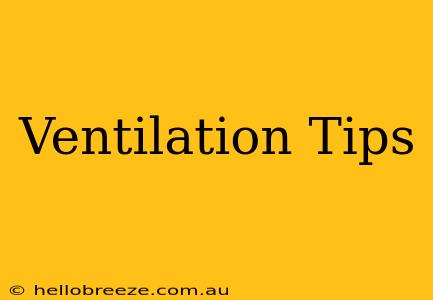Proper ventilation is crucial for maintaining a healthy and comfortable living environment. Poor ventilation can lead to a buildup of pollutants, moisture, and allergens, negatively impacting indoor air quality and potentially causing respiratory problems and other health issues. This guide provides essential ventilation tips to improve your home's air quality and overall well-being.
Understanding the Importance of Ventilation
Before diving into specific tips, it's vital to understand why ventilation is so important. Think of your home as a sealed container. Without proper ventilation, the air inside becomes stagnant, trapping:
- Pollutants: These include gases from cooking, cleaning products, and even building materials.
- Moisture: Excess moisture from showers, cooking, and even breathing can lead to mold and mildew growth.
- Allergens: Dust mites, pet dander, and pollen can accumulate, triggering allergic reactions.
- Odors: Stale air can trap unpleasant smells, making your home feel less inviting and impacting your mood.
Effective Ventilation Strategies
Implementing these strategies can significantly improve your home's ventilation:
1. Open Windows Regularly
This is the simplest and most effective method. Open windows for at least 15-30 minutes several times a day, especially after showering or cooking, to allow fresh air to circulate and stale air to escape. Consider cross-ventilation by opening windows on opposite sides of your home for optimal airflow.
2. Utilize Exhaust Fans
Exhaust fans in kitchens and bathrooms are designed to remove moisture and pollutants. Always turn them on while showering, cooking, or cleaning and allow them to run for a few minutes afterward to ensure thorough ventilation.
3. Install a Whole-House Ventilation System
For more comprehensive ventilation, consider a whole-house ventilation system. These systems continuously exchange stale indoor air with fresh outdoor air, providing a constant supply of clean air throughout your home. This is particularly beneficial in areas with poor air quality or for homes with high levels of moisture. Different types of whole-house ventilation systems exist, so research your options to find one suitable for your home's needs and budget.
4. Check and Clean HVAC Filters Regularly
Your HVAC system plays a significant role in air quality. Regularly cleaning or replacing your HVAC filters is crucial to maintain efficiency and prevent the recirculation of dust, pollen, and other particles. Aim to replace filters every 1-3 months, depending on usage and the type of filter.
5. Consider a Dehumidifier
In humid climates or areas prone to moisture buildup, a dehumidifier can help control humidity levels, preventing mold and mildew growth. Regularly empty the dehumidifier's water tank to avoid creating a breeding ground for bacteria and fungi.
6. Natural Ventilation Solutions
Maximize natural ventilation by strategically placing plants around the home; plants can help filter the air and improve air quality naturally. Keep furniture from blocking air vents. Consider installing attic vents and soffit vents to help with better air circulation throughout your home.
Maintaining Good Ventilation Habits
Regularly maintaining these ventilation practices is key to ensuring a healthy home environment. Consider incorporating these habits into your daily routine. By focusing on proper ventilation, you can create a healthier, more comfortable, and more enjoyable living space for yourself and your family. Addressing ventilation issues can drastically impact your home environment, promoting improved health and well-being.

